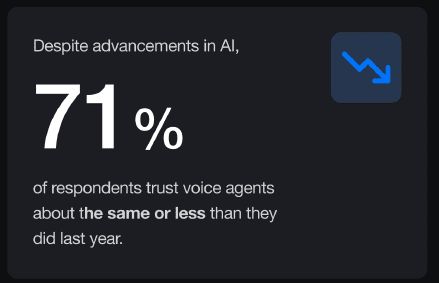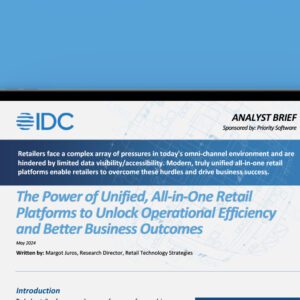Everyone’s been there — you try your mightiest to get the machine on the other end of the phone to understand what you need, until you give in to frustration and just begin to scream “representative.” Generative AI was supposed to change all that — with this magical new technology, automated voice agents were going to be smarter, more responsive and, most importantly, more accurate.

But new research shows that may not yet be the case. According to a study commissioned by AI voice solution Tenyx and conducted by Centiment, seven out of every 10 consumers are frustrated with current virtual agents, and 55% of respondents said they would either stop doing business or go with a different company if faced with the automated customer service technologies in use today.
With consumers’ brand loyalty at all-time lows, even one customer service fail can have huge implications for a business. But with all the economic pressure retailers are currently facing, it makes financial sense for these companies, and other businesses, to turn to automated solutions when possible. The good news is that there’s still hope for automated voice agents — if they could match the performance of human agents, two-thirds of people said they would opt to “often” or “always” use an automated voice agent. But what will it take to get there?
“Negative experiences with automated systems can lead to customer churn and damage a brand’s reputation,” said Itamar Arel, CEO of Tenyx in an interview with Retail TouchPoints. “And consumers are overwhelmingly frustrated with the experiences they’ve had with automated voice AI agents thus far. The good news is there is a growing demand for advanced, industry-specific AI solutions that can handle an increasingly wider range of customer interactions. Investing in these technologies will help streamline operations and boost business growth.”
Advertisement
Most Customers Still Prefer to Talk to a Human

Conversational AI deployments in contact centers will lower agent labor costs by $80 billion by 2026, according to Gartner. That’s not just a huge win for companies; human agents indicate that AI makes their jobs easier and allows them to be more productive. However, the Tenyx report revealed that the majority of respondents (67%) still prefer to talk to a human. In fact, almost 30% said they would always prefer to speak to a human agent, compared with only 3% who would always prefer to talk to an automated voice agent.
While respondents’ biggest problem with automated voice agents is their “inability to handle complex issues,” companies’ biggest problem is the impact of a bad experience on brand loyalty: Only 20% of respondents said they would be a returning customer based on their recent experience with a company’s automated voice agent. Instead, 29% said they would be less inclined to buy products or services from that company; 25% said they would consider going with a different company; and 13% said they would never do business with that company again.
“It’s clear that companies need to enhance their automated voice agents to meet customer expectations, but there isn’t a one-size-fits-all solution,” said Arel. “Human agents are indispensable for handling complex and nuanced issues, while automated voice agents have the potential to excel with routine and repetitive tasks. The key is strategic deployment. Investing in continual learning and domain-specific optimization can bridge the gap between customer needs and what current technology can deliver. Ultimately, a hybrid approach, where human agents concentrate on high-value, intricate issues while automated systems handle repetitive inquiries quickly and accurately, can offer the best of both worlds.”
The Best Solution is a Mix of Human and AI

Even though the majority of consumers said they would still opt for a human agent, they have problems with them as well. The biggest complaint about human agents was long wait times (39%) and the agent having difficulty understanding accents or speech clarity (39%).
This presents an opening for companies, because even though many respondents opted to engage with humans when given a choice, the report revealed that if AI voice agents could match human performance, most people would use the technology often (27%), very often (21%) or even always (18%).
“Improving customers’ experience with automated voice agents requires a multi-faceted approach,” advised Arel. “Companies now have an opportunity to invest in advanced AI systems that are context-aware and capable of accurately responding to a wider range of customer queries.

“Reducing response times and improving the system’s ability to handle nuanced requests, accents and varied speech patterns is crucial,” Arel added. “Continuous training and optimization based on real customer interactions can significantly enhance performance, and implementing feedback loops where customers can share their experiences provides invaluable insights for system improvements. And perhaps most importantly, ensuring a smooth transition to human agents when the AI reaches its limits will help customers feel supported throughout their interaction.”













